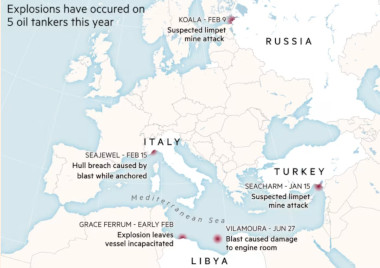This now seems to happen with some regularity:
An explosion struck the Marshall Islands-flagged oil tanker Vilamoura, carrying approximately one million barrels of crude, off Libya’s coast, according to its Greek operator, TMS Tankers. – Greek City Times, Jul 1 2025
The explosion flooded the engine room, disabling the vessel. TMS Tankers reported that the ship, which departed from Zueitina, Libya, en route to Gibraltar, will be towed to Greece on Tuesday or Wednesday. The cause of the explosion remains undisclosed.
The possibility that the Vilamoura was hit by a mine was raised on Friday by security firm Vanguard, but it said that nothing had been confirmed by officials.
The operator distanced itself from speculation that the ship had been targeted by saboteurs.
According to the Financial Times this is at least the fifth tanker (archived) this year that had became casualty of some explosives:
A series of mysterious limpet mine attacks on oil tankers has shaken the shipping world, prompting speculation that the explosions were part of a state-backed sabotage campaign.
Five vessels have been hit by deliberate blasts this year, with the latest incident flooding the engine room of the Greek-owned tanker the Vilamoura last week as it sailed off the coast of Libya.
All the vessels called at Russian ports within weeks of the attacks, prompting some security experts to suggest that Ukraine had a hand in the explosions.

The FT account leaves out a Russian cargo ship that was attacked with explosives and sank in late 2024:
The Russian operator of a cargo ship that sank in the Mediterranean Sea between Spain and Algeria said Thursday that it had been hit by a series of explosions in an act of sabotage.
Oboronlogistica, a state-controlled company that operated the Ursa Major freighter, said it was wrecked by three powerful explosions just above the water line in what it described as a “terrorist attack” that caused it to sink.
It said in a statement carried by Russia’s state RIA Novosti news agency that the explosions left a hole in the ship’s starboard and filled the engine room with acrid smoke, hampering the crew’s attempts to access it. The company added that the damage to the engine room made it impossible to activate pumps and keep the ship afloat.
…
The company said the ship, one of Russia’s largest cargo ships, had sailed from St. Petersburg and was carrying two heavy cranes and other equipment to the port of Vladivostok on Russia’s far eastern coast.
All these attacks seem to have been made with magnetic limpet mines. These get attached to a ships hull while the ship is anchored or moored. They can be exploded by a timer or radio signal.
The campaign against Russian related ships may well be an Ukrainian operation. But I would be astonished to learn that the British are not involved in it.
Ukraine is not known for wide access to ports in the Mediterranean Sea and for the necessary qualified diving specialists. Britain’s Special Boat Service is:
The SBS has a subunit dedicated to operating Swimmer Delivery Vehicles (SDVs) known as the SDV Troop.
Such vehicles, launched from submarines, are ideal for installing limpet mines to the hull of unsuspecting ships.
Britain has helped to plan the Ukrainian attack in Kursk. It has been involved in several sabotage operations by the Ukrainian Military Intelligence Service on Russian ground. British soldiers are dying on the battlefield in Ukraine.
When investigating the sabotage operations against those ships the Russian counter terrorism forces should look out for British, not for Ukrainian, actors.
Reprinted with permission from Moon of Alabama.











